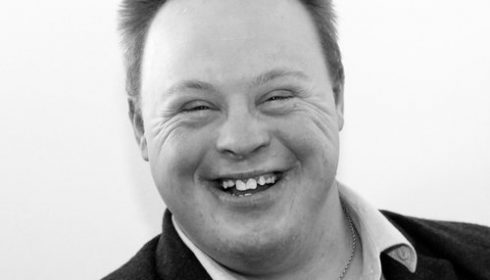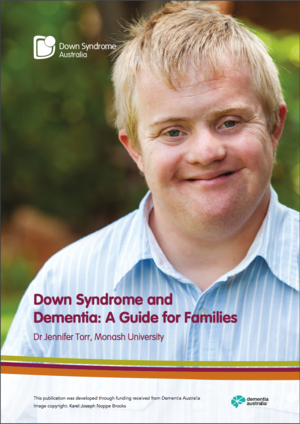What does the research tell us?
The full article is available in the following formats
Click to download
Dr Liz Evans is a NHMRC-ARC Dementia Research Fellow and Tanya Duckworth is a research assistant with qualifications in psychology and cognitive neuroscience. They are from the Department of Developmental Disability Neuropsychiatry (3DN), within the School of Psychiatry at UNSW Sydney.
In this fantastic article, Evans and Duckworth give a comprehensive overview of the current research into the connection between Down syndrome and dementia. They also discuss the early signs of dementia and how to differentiate those signs from mental illness. There are also some great strategies for managing the onset of dementia for family members.
‘Research suggests that virtually all people with Down syndrome have a build-up of amyloid plaques in their brain by about the age of 40. Yet for most, the outward symptoms of dementia do not start for some years after this and some studies report people who live into old age without developing symptoms.’

Bonus content

DSA has produced a new resource on dementia.
Click the photo to download the dementia resource.
Click here for the full set of resources on ageing from DSA.
Further reading
The full reference list for this article was printed in the journal when it was published on December 2017 and provided below:
1. Wilson, L., et al., Understanding the process; links between Down Syndrome and dementia. Intellectual Disability and Dementia; Research into practice. London: Jessica Kingsley Publishers, 2014.
2. Sinai, A., T. Chan, and A. Strydom, The Epidemiology of Dementia in People with Intellectual Disabilities. Intellectual Disability and Dementia: Research into Practice, 2014: p. 24.
3. Margallo‐Lana, M., et al., Fifteen‐year follow‐up of 92 hospitalized adults with Down’s syndrome: incidence of cognitive decline, its relationship to age and neuropathology. Journal of Intellectual Disability Research, 2007. 51(6): p. 463-477.
4. McCarron, M., et al., A prospective 20-year longitudinal follow-up of dementia in persons with Down syndrome. J Intellect Disabil Res, 2017. 61(9): p. 843-852.
5. Lautarescu, B.A., A.J. Holland, and S.H. Zaman, The Early Presentation of Dementia in People with Down Syndrome: a Systematic Review of Longitudinal Studies. Neuropsychol Rev, 2017. 27(1): p. 31-45.
6. Nieuwenhuis-Mark, R.E., Diagnosing Alzheimer’s dementia in Down syndrome: problems and possible solutions. Res Dev Disabil, 2009. 30(5): p. 827-38.
7. Castro, P., S. Zaman, and A. Holland, Alzheimer’s disease in people with Down’s syndrome: the prospects for and the challenges of developing preventative treatments. Journal of Neurology. 264(4): p. 804-813.
8. Courtenay, K. and N. Eadie, Medication treatment of dementia in people with intellectual disabilities. Intellectual Disability and Dementia: Research into Practice, 2014: p. 62.
9. Torr, J., Dementias, in Psychiatric and Behavioural Disorders in Intellectual and Developmental Disabilities C. Hemmings and N. Bouras, Editors. 2016, Cambridge Univrsity Press: Cambridge, UK.
10. Ballard, C., et al., Dementia in Down’s syndrome. The Lancet Neurology, 2016. 15(6): p. 622-636.
11. Schupf, N. and G.H. Sergievsky, Genetic and host factors for dementia in Down’s syndrome. The British Journal of Psychiatry, 2002. 180(5): p. 405-410.
12. World Health Organization, Ageing and Intellectual Disabilities – Improving Longevity and Promoting Healthy Ageing: Summative Report. 2000, World Health Organization: Geneva, Switzerland.
13. Reppermund, S. and J.N. Trollor, Successful ageing for people with an intellectual disability. Curr Opin Psychiatry, 2016. 29(2): p. 149-54.
14. Sisirak, J. and B. Marks, Health and wellness strand: recommendations from National Goals Conference 2015. Inclusion, 2015(3): p. 4.
15. Wilcock, D.M., F.A. Schmitt, and E. Head, Cerebrovascular contributions to aging and Alzheimer’s disease in Down syndrome. Biochimica et Biophysica Acta (BBA)-Molecular Basis of Disease, 2016. 1862(5): p. 909-914.
16. Trollor, J., et al., Positive cardiometabolic health for adults with intellectual disability: an early intervention framework. Australian Journal of Primary Health, 2016. 22(4): p. 288-293.
17. Dodd, K., et al. Dementia and people with intellectual disabilities: Guidance on the assessment, diagnosis, interventions and support of people with intellectual disabilities who develop dementia 2015.
18. Towers, C. and H. Wilkinson, Planning ahead: Supporting families to shape the future after a diagnosis of dementia. Intellectual disability and dementia: Research into practice, 2014: p. 161-182.
19. Carling-Jenkins, R. and C. Bigby. Supporting people with intellectual disability and dementia: A training and resource guide PowerPoint presentation for managers of disability organisations.; Available from: http://www.karingal.org.au/media/529677/day_one_-_dsws_-_karingal_theme.pdf.
20. Jokinen, N., et al., Guidelines for structuring community care and supports for people with intellectual disabilities affected by dementia. Journal of Policy and Practice in Intellectual Disabilities, 2013. 10(1): p. 1-24.
21. Carling-Jenkins, R., C. Bigby, and T. Iacono, Family experiences of supporting a person with Down syndrome and dementia in Australia. Intellectual disability and dementia: Research into practice, 2014: p. 145-60.


0 Comments